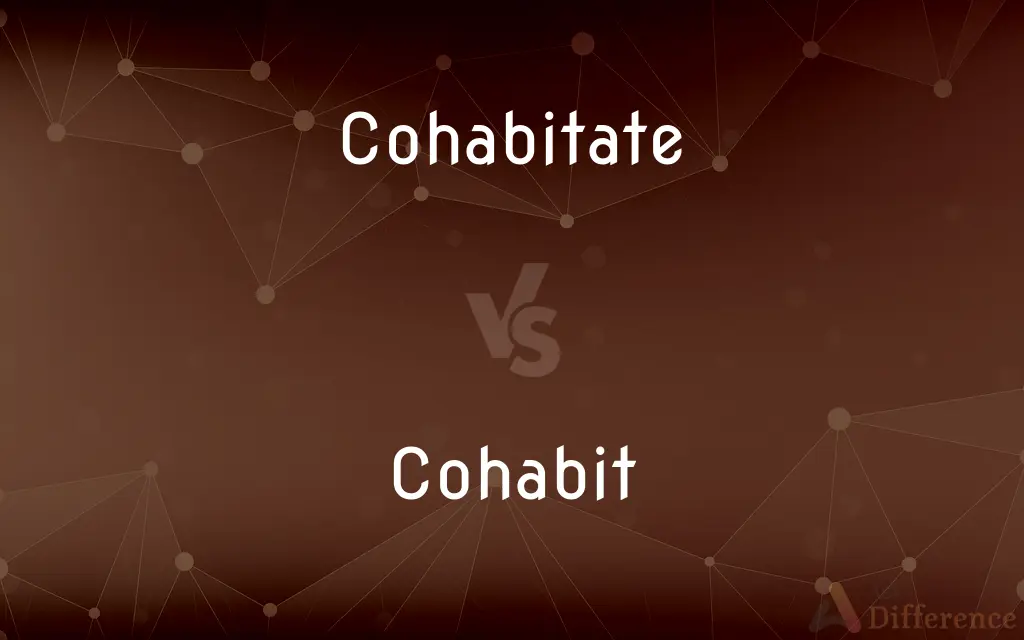Cohabitate vs. Cohabit — What's the Difference?
By Tayyaba Rehman & Maham Liaqat — Updated on March 19, 2024
Cohabitate and cohabit both refer to living together, usually in a domestic arrangement, but "cohabitate" is less commonly used in formal contexts.

Difference Between Cohabitate and Cohabit
Table of Contents
ADVERTISEMENT
Key Differences
Cohabitate often appears in discussions around legal and social contexts, emphasizing the aspect of living together without being married. On the other hand, cohabit is a more general term that simply means to live together in the same household, regardless of the nature of the relationship or the legalities involved.
Both terms imply a shared living arrangement, but cohabitate sometimes carries a connotation of coexisting in a domestic partnership that is not sanctioned by marriage. Whereas, cohabit is more neutral, indicating the act of living together without implying any specific legal or social status.
The choice between cohabitate and cohabit can depend on the desired specificity or formality of language. Cohabitate might be chosen for discussions focusing on the legal or social implications of living together without marriage, while cohabit is often used in broader contexts where the specifics of the relationship are not the focus.
In legal documents or discussions about domestic law, "cohabitate" can be preferred to specifically address situations where individuals live together as a couple without being married. Conversely, "cohabit" is more likely to be used in general discussions or studies about living arrangements, without necessarily implying a romantic relationship.
Despite their nuances, in everyday language, the distinction between cohabitate and cohabit is often blurred, and the terms are used interchangeably by many. The choice of term may vary by region, preference, or the context in which it is being used.
ADVERTISEMENT
Comparison Chart
Common Usage
Less common, more formal
More common, broader usage
Connotation
Often implies a domestic partnership without marriage
Neutral, indicates living together without specific implications
Preferred Context
Legal and social discussions
General discussions about living arrangements
Implication of Relationship
May imply a romantic partnership without marriage
Neutral regarding the nature of the relationship
Formality
Considered more formal in some contexts
Less formal, more universally applicable
Compare with Definitions
Cohabitate
A formal term used in legal and social discussions about living arrangements.
Laws regarding the rights of couples who cohabitate vary by country.
Cohabit
To live together in the same household, not necessarily with romantic implications.
After college, I decided to cohabit with my best friend.
Cohabitate
Sharing a living space often with a connotation of a romantic relationship without marriage.
Many young couples choose to cohabitate to save money.
Cohabit
Living together in any context, often without legal implications.
They cohabit in a large house with three generations of their family.
Cohabitate
To live together in a domestic partnership without being married.
The couple decided to cohabitate before considering marriage.
Cohabit
Neutral term for shared living situations.
Cohabiting has become a common trend among millennials.
Cohabitate
Living together while maintaining separate personal lives.
They cohabitate in the same apartment but have different schedules.
Cohabit
Sharing living space with anyone, including family or roommates.
Cohabiting with roommates can help reduce living expenses.
Cohabitate
Cohabitation with emphasis on partnership aspects.
Cohabitate often brings up topics like shared finances and responsibilities.
Cohabit
A broad term encompassing any shared living arrangement.
Studies show that more people now choose to cohabit before marriage.
Cohabitate
To cohabit.
Cohabit
To coexist, as animals of different species.
Cohabitate
To cohabit.
Cohabit
(intransitive) To coexist in common environs with.
Cohabit
To inhabit or reside in company, or in the same place or country.
The Philistines were worsted by the captived ark . . . : they were not able to cohabit with that holy thing.
Cohabit
To dwell or live together as husband and wife.
The law presumes that husband and wife cohabit together, even after a voluntary separation has taken place between them.
Cohabit
Room or live together; usually said of people who are not married and live together as a couple
Common Curiosities
What is the key difference between cohabitate and cohabit?
Cohabitate often has a formal or legal context, implying a domestic partnership without marriage, while cohabit is a more general term for living together.
How are cohabitate and cohabit viewed legally?
Legal distinctions may favor "cohabitate" to address the specifics of domestic partnerships without marriage, while "cohabit" is more general and less likely to be used in legal contexts.
Can cohabitate and cohabit be used interchangeably?
While they can be used interchangeably in casual contexts, cohabitate is more specific to partnerships without marriage, especially in formal discussions.
Do both terms imply a romantic relationship?
Cohabitate often implies a romantic relationship without marriage, whereas cohabit is neutral and can refer to any shared living situation.
Is there a social stigma associated with either term?
Social perceptions vary, but "cohabitate" may carry more implications regarding the nature of the relationship, which could be subject to stigma in some cultures.
Does cohabiting before marriage impact the relationship?
Studies on the impact of cohabiting before marriage vary, showing both positive and negative outcomes, without a clear consensus.
Are there any religious implications with cohabitating?
In some religious contexts, "cohabitate" might be scrutinized due to the implication of a romantic relationship without marriage.
Can family members cohabit?
Yes, the term "cohabit" can also apply to family members living together, as it is neutral regarding the nature of the relationship.
How do cohabitate and cohabit relate to modern living arrangements?
Both terms are relevant to modern living arrangements, reflecting the growing trend of couples and individuals choosing to live together in various contexts.
Can cohabitating partnerships have legal recognition?
In some places, cohabitating partnerships can have legal recognition similar to marriage, offering various rights and responsibilities.
Is cohabitate or cohabit more common?
Cohabit is more commonly used and broadly applicable, regardless of the specifics of the living arrangement.
How do cultural differences affect the use of cohabitate and cohabit?
Cultural differences significantly influence the acceptance and implications of cohabitating and cohabiting, affecting societal norms and legal frameworks.
Are there financial benefits to cohabitating or cohabiting?
Both arrangements can offer financial benefits, such as shared living expenses, but the specifics may vary depending on the nature of the relationship.
Does cohabitating affect legal rights or benefits?
Depending on the jurisdiction, cohabitating couples may have different legal rights or benefits compared to married couples, which is why "cohabitate" is often used in these discussions.
How does one choose between cohabitate and cohabit in writing?
The choice depends on the context: "cohabitate" for formal, legal, or partnership-specific discussions, and "cohabit" for broader or more neutral descriptions of living together.
Share Your Discovery

Previous Comparison
Bud vs. Tween
Next Comparison
Socialised vs. SocializedAuthor Spotlight
Written by
Tayyaba RehmanTayyaba Rehman is a distinguished writer, currently serving as a primary contributor to askdifference.com. As a researcher in semantics and etymology, Tayyaba's passion for the complexity of languages and their distinctions has found a perfect home on the platform. Tayyaba delves into the intricacies of language, distinguishing between commonly confused words and phrases, thereby providing clarity for readers worldwide.
Co-written by
Maham Liaqat















































